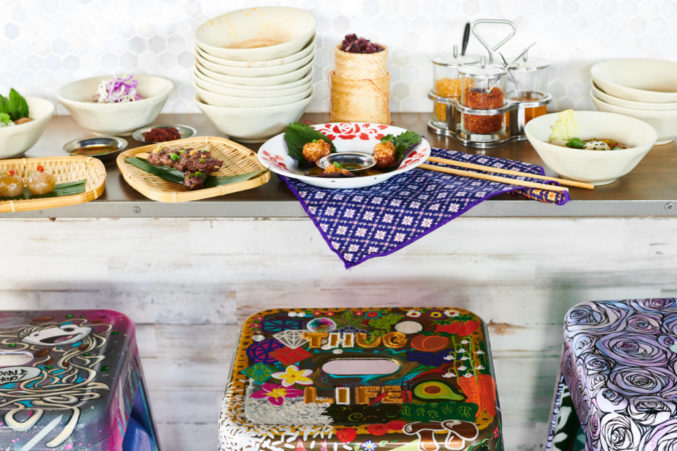As the world wakes brutally to the reality of the coronavirus, restaurateurs like Reyna Duong of the Vietnamese counter-order sandwich shop Sandwich Hag are reeling from the effects they see in the world around them.
Amid coronavirus-fueled anxiety, she and others are diving into preparation and precaution. Her two pump bottles of hand sanitizer—one at the order window, one at pick-up—are showing up on social media. Labels ask customers to sanitize before signing the iPad—the only point-of-sale system—in an order to help prevent the spread of germs.
She makes the point that coronavirus-preventative measures are all about getting customers to do what employees are already doing in the kitchen: following the appropriate protocol of hand-washing and sanitation. She is a restaurateur who has routinely posted health inspection scores prominently. And as soon as Duong became aware of the threat of coronavirus and the damaging effects it might have on the hospitality industry, she approached her staff at their weekly meeting about extra measures regarding customers sanitizing, including verbal reminders for anyone who might miss the signs. “We practice every single day,” she says.
Duong has seen her precaution greeted with gratitude. “We politely asked every single one of our customers to sanitize their hands before signing the iPad and received nothing but ‘thank yous’!” she wrote in an Instagram post on March 7. “We’ve always taken food safety very seriously, and we truly appreciate that y’all feel the same way.” But it’s important to note that the foundation was already there. “Now it’s a matter of getting customers to do the same things we do.”
Donny Sirisavath of Khao Noodle Shop, too, has made sanitizing a priority. At this communal-dining Laotian hotspot that has been hopping since Sirisavath rocketed into local and national attention, tables are obsessively sanitized—and “the minute someone touches the iPad” it’s wiped down. The goal is to “make [diners] feel comfortable.”
Sirisavath, who was traveling in Southeast Asia recently, and then in self-imposed quarantine, has been checking the numbers at his restaurant. “We saw the numbers dropping because of the month: February is usually a slower time. [But] we didn’t see a dramatic drop. Of course, being an Asian restaurant, some people understand that it’s not a Chinese restaurant, so it might not be affected [as much], but some doesn’t know the difference. At the end of the day, it’s education,” he says.
Both restaurateurs exist in a limelight, both known for being community organizers and activists in addition to restaurateurs. It’s no surprise, then, that they see their social media presence as a platform—in part to illuminate the very specific effects on Asian-owned businesses. Duong is a regular frequenter of family-owned businesses like Imperial Cuisine, a Chinese hand-pulled noodle bastion in Richardson; La Me, a Vietnamese cafe in Far North Dallas; and Garden Restaurant, a Garland Chinese dim sum spot. She has seen the negative impacts of the stereotyping. “They ask me how it’s going,” she says of the owners who know her. Business is “uneven,” they’re telling her.
“Quite honestly, it’s part of the racism that’s been going on since forever,” says Duong. As for her own part: “All I can do is post on social media and encourage people” and find the places “where I can help support.”
Sirisavath had an epiphany when a Chinese foot spa he and his wife frequent was unusually empty. “And it just clicked in my head. I need to support businesses that involve Chinese business owners. We’re stronger as a community; I need to be able to help out the community.” He believes that “those that have that attention and that limelight should be the ones to say, ‘Hey!’ to their followers. ‘Hey! You can still go out to eat, go out and support their business.’”
And it extends to taking care of his employees’ health: “It’s not just my livelihood, it’s my employees’ livelihood. Some people are supporting their parents or their families. It affects everyone. That’s the thing about the industry. It’s hard when something like this happens. If we are sick, or we have a fever, [we’re out].”
“We’re in the spotlight,” he continues. “So we need to be able to use our spotlight. Make it a message. Reassure our customers.” And make sure his own employees are safe.





